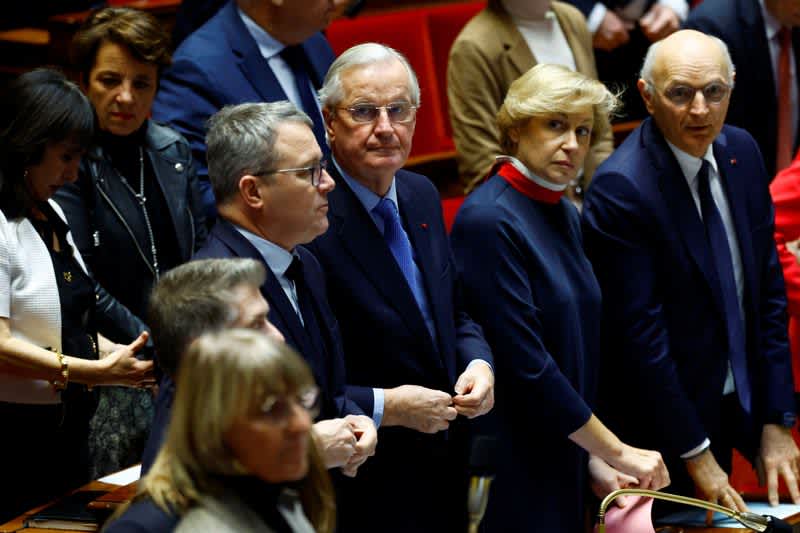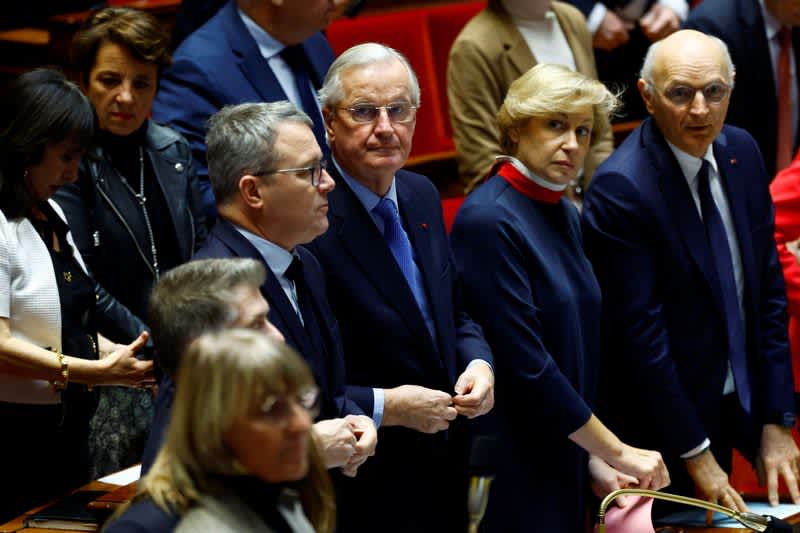On December 4, 2024, France experienced a historic event not seen since 1962: the removal of a government through a vote of no confidence. Prime Minister Michel Barnier was ousted after the National Assembly approved the no-confidence motion introduced by the left-wing alliance New Popular Front (NFP), with the crucial support of the far-right party National Rally (RN), led by Marine Le Pen.
This event marks a new chapter in French political history, with significant consequences for the future of Emmanuel Macron’s presidency, the country’s economy, and the stability of the French Parliament. The fall of Barnier’s government highlights the extreme political fragmentation in France and the growing difficulty of forming stable parliamentary majorities.
The Origin of the Crisis: A Controversial Budget
The political conflict began with the presentation of the 2025 budget, a fiscal plan designed by Michel Barnier’s government to reduce the public deficit through austerity measures. The proposal faced fierce criticism from the left, which accused the government of leaning toward the right to secure parliamentary support.
To bypass the lack of parliamentary support, on December 2, Barnier invoked Article 49.3 of the French Constitution, a tool that allows laws to be passed without a parliamentary vote. This move was seen as an authoritarian measure and provoked outrage from the opposition, which then filed the motion of no confidence to overthrow the government.
The motion was spearheaded by the New Popular Front (NFP), led by Jean-Luc Mélenchon, and received backing from the far-right party National Rally (RN), led by Marine Le Pen. This unusual alliance between the left and the far right was described by President Macron as an “anti-republican front”. The no-confidence motion was approved with 331 votes in favor and 288 against, significantly exceeding the majority required to oust the government.

The Aftermath: Barnier’s Resignation and Macron’s Reaction
Following the no-confidence vote, Prime Minister Michel Barnier submitted his resignation, placing the management of the crisis in Emmanuel Macron’s hands. The French president promptly addressed the nation in a televised speech, where he firmly declared:
“I will fulfill my term until the end,” signaling his intent to remain in office. (elpais.com)
Macron announced that he would appoint a new prime minister in the coming days and proposed an emergency law to ensure the collection of taxes and avoid a government shutdown. His speech was an attempt to project strength and regain control of the situation, though the current political landscape appears more uncertain than ever.
Economic Impact and Market Concerns
The collapse of Michel Barnier’s government has raised concerns in financial markets. The rating agency Moody’s warned that this development exacerbates France’s political deadlock and reduces the likelihood of consolidating public finances. As a result, France’s risk premium has reached levels not seen since 2012, reflecting investor anxiety and fears of a possible domino effect on other European economies.
Investor fears center on the government’s inability to approve the 2025 budget, which could trigger government shutdowns and affect France’s economy. Furthermore, uncertainty over the appointment of a new prime minister adds to market unease.
President Macron sought to reassure the markets by promising that his administration would take measures to prevent a government shutdown. However, investors remain cautious, awaiting the appointment of the new prime minister and the first decisions of the incoming administration.
Political Reactions and Mélenchon’s Criticism
One of the key figures in the no-confidence motion was Jean-Luc Mélenchon, leader of the left-wing movement and the New Popular Front (NFP). After Barnier’s dismissal, Mélenchon delivered a scathing critique of Macron, stating:
“Macron will end up leaving; he won’t last 30 months forming governments every three months,” predicting that the president will not complete his term. (elpais.com)
Mélenchon argued that Macron’s strategy of governing with a parliamentary minority had failed and that he would be unable to prevent future no-confidence motions. His prediction has increased political pressure on the president, who is already dealing with a deeply fragmented National Assembly.
The Role of Marine Le Pen and the Far Right
One of the most controversial aspects of the no-confidence motion was the support of the National Rally (RN), Marine Le Pen’s far-right party, for the initiative put forward by the left. The cooperation between the far-left and far-right to oust the government was described by Macron as an “anti-republican front”.
Marine Le Pen, for her part, celebrated the government’s fall and announced that her party would actively participate in the negotiations for the appointment of a new prime minister. Her intervention underscores the growing influence of the far right in French politics, a force that has steadily gained ground in recent years.
The Future of Governance in France
The collapse of Michel Barnier’s government raises a pressing question: Who will be the next prime minister? The decision rests with President Macron, who must appoint a figure capable of securing support from a deeply divided National Assembly.
Macron may opt for a conciliatory figure who can attract support from both the right and the center, or he may choose an independent candidate to attempt a broader consensus across political forces. However, the lack of a stable parliamentary majority suggests that the new administration will likely face future no-confidence motions.
The political instability in France could have significant implications at the European level, especially if the country fails to approve its 2025 budget. European leaders are closely monitoring the crisis, as France’s economy is one of the most influential in the European Union. Any signs of prolonged instability could negatively impact Eurozone markets.
The ouster of Michel Barnier’s government has ushered in a period of political uncertainty in France. The no-confidence motion, driven by an alliance between the left and the far right, has destabilized the country’s governance and placed President Emmanuel Macron’s ability to complete his term in doubt.
Macron’s next step will be to appoint a new prime minister, but the lack of a stable parliamentary majority suggests a challenging road ahead. Meanwhile, the financial markets are on high alert as France’s risk premium increases and rating agencies warn of the potential impact on public finances.
The outcome of this crisis will have a profound impact not only on France but on the political stability of the European Union. The decisions Macron makes in the coming days will be crucial in determining whether he can regain control of the situation or, as Mélenchon predicts, be forced to leave office before 2027.
